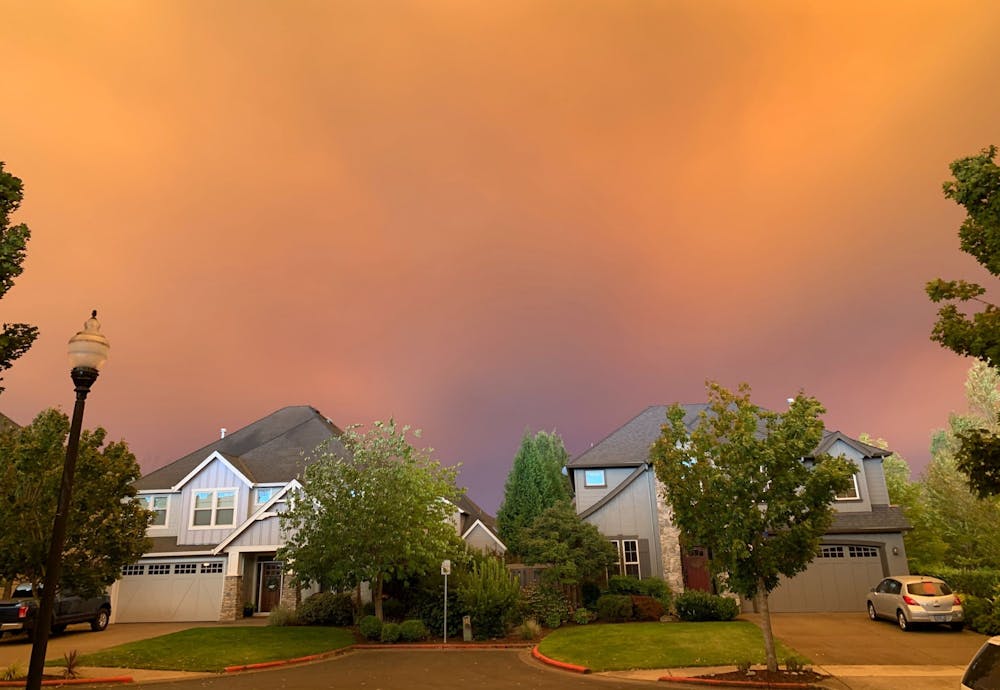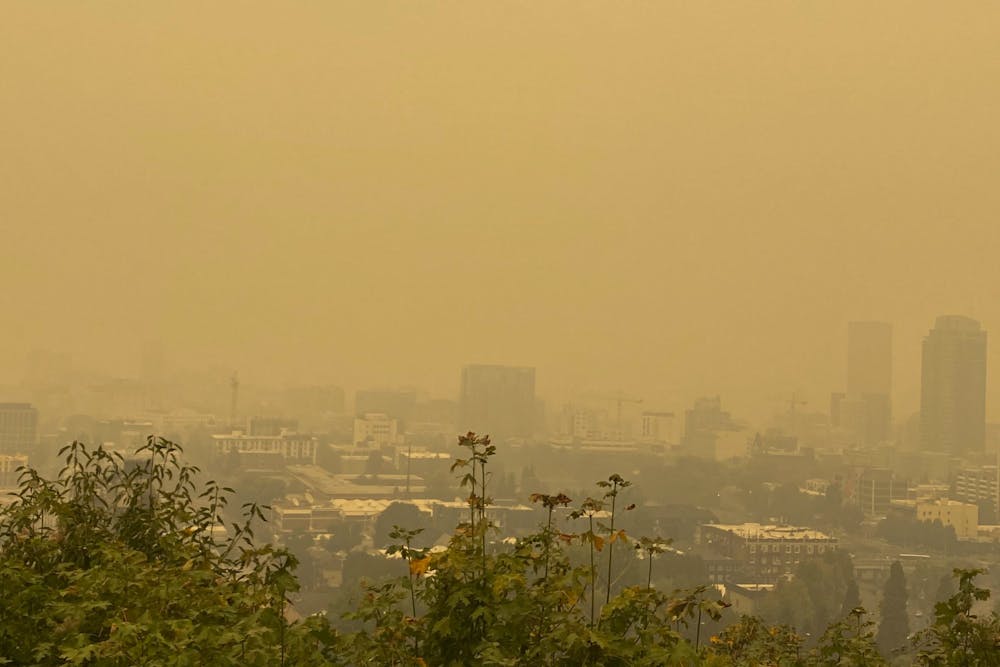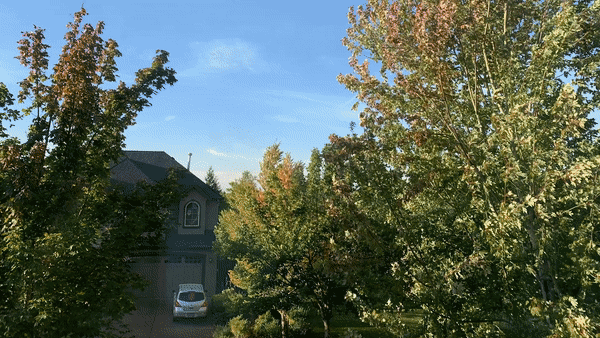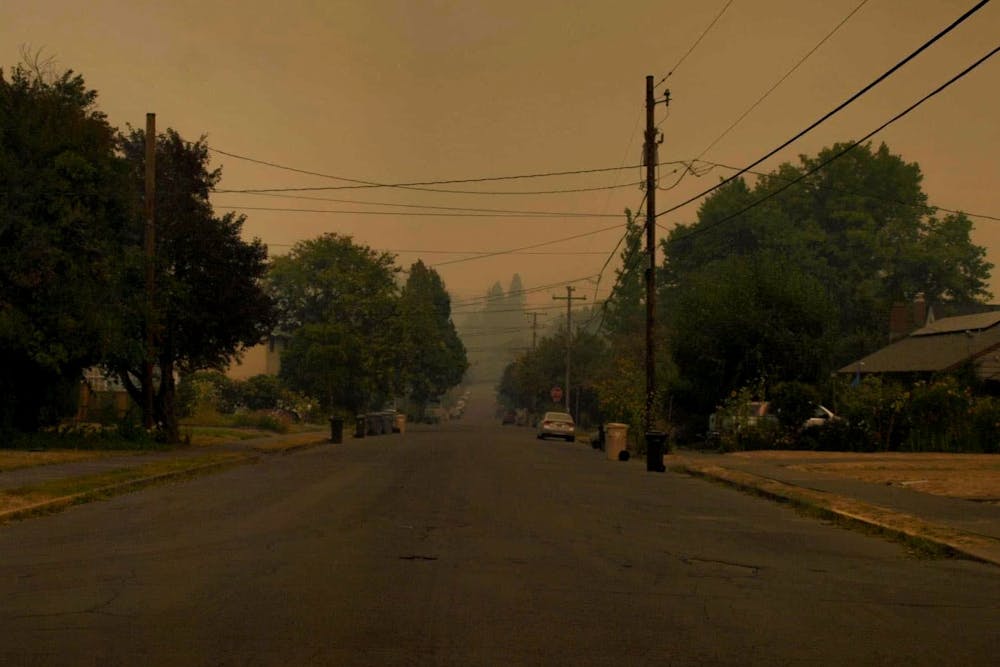During the past month, Engineering and Wharton sophomore Aliris Tang had to be ready to leave her home in Portland, Ore., at a moment's notice. As wildfires devastated the West Coast, Tang would wonder what things she might bring with her if and when evacuation day came.
“Today, I can see the sunlight streaming into my room and the sun is actually a yellow and white color," Tang, who was a former General Assignments reporter for the Daily Pennsylvanian, said. "If I ever saw the sun last week, it was like red because the smoke was so thick.”
The wildfires raging across California, Oregon, and Washington State have burned millions of acres, threatened to displace thousands of people, and killed at least 35. Penn students from the West Coast — many of whom remain at home due to the coronavirus pandemic — began the fall semester from areas with the most dangerous air quality on Earth right now.

Oregon in early September.
Luckily for Tang, she never had to abandon her home. 2020 College graduate and former DP General Assignments reporter Michelle Shen and her family, on the other hand, packed up their belongings and left home in South Bay, Calif. shortly after receiving a vague evacuation notice, later reversed by the Santa Clara County Fire Department.
"They didn’t give us a time interval, like how much time we had. They didn't tell us where to go. They said where the fire was generally, and I was like we should just drive away from that," Shen said. "The sky was just orange and gray, and it looked very doomsday-esque."
While Tang said she would pack essentials like her laptop and water bottle, Shen chose to pack items like her childhood journal and books she got signed by renowned figures who visited Penn when she was a student.
"I remember texting all my friends after and I was like, if you have five minutes to leave your house and you only had five minutes to pack, what would you bring with you? What would you value?" Shen said.
“I woke up and I thought it was nighttime, but it was just orange,” Engineering sophomore Micherice Tao said about the first day the fires neared her hometown of San Marin, Calif. Though Tao said she has grown accustomed to “fire seasons” in late October and November, this sudden change in atmosphere came as an early shock to her. The air smelled “smoky” as a fine layer of ash settled on everything outside, she said, including her family’s grill and the neighborhood cars.

Oregon in early September.
“The orange skies are super apocalyptic,” Tao said. “As we drove through it in the car, we were like wow, this is like the apocalypse. And then all over the web, people also felt like it was the apocalypse.”
Before she flew back to Philadelphia on Sept. 12, College junior Nicole Yeh experienced the shocking onslaught of wildfires near her hometown of Sunnyvale, Calif. She recalled driving to her workplace in the morning and seeing a massive cloud of grey approaching from the direction of the Northern California mountains where the wildfire was raging. Like Tao, her car was also covered in ash and the air outside her house smelled like a “barbecue” for an entire week.
The air quality index in her region reached around 200 during another round of smoke, Yeh said. Air quality index values of 0 to 50 are considered "good," while 151 to 200 are considered "unhealthy" and in the red zone. Westerly winds have carried the wildfires’ smoke nearly 3,000 miles east to central Pennsylvania, Penn Live reported, but the smoke is currently not affecting the state’s air quality.
“The outside in general looked like it had a filter everywhere. It was like this weird orange-ish filter,” Yeh said. “It really threw me off and it was just really disturbing. It felt like I was kind of in a simulation.”

Oregon in early September.
One of Yeh’s favorite parks, Big Basin State Park in Northern California, burned down as a result of the fires. Describing it as a “beautiful” place with some of the oldest Sequoias in that area, she said it was heartbreaking to see a photo of the Park’s area near the beach completely up in flames. And while acres of land were burning in the mountains, Yeh was also shocked and saddened to see a coyote in her neighborhood park for the first time in 20 years. Animals like mountain lions and coyotes were coming down from the mountains where their habitats had been destroyed, she said.
Yeh also had many mutual friends whose houses were burned down or who just narrowly escaped the fires until they were put out.
Wharton sophomore Brandon Pride, who is a Sports Editor for The Daily Pennsylvanian, said the wildfires burned down the vast majority of Camp Okizu, a nearly 500-acre camp in North California for children with cancer, where he and his family have volunteered for about 15 years. Pride's hometown of Morgan Hill, Calif., was doused in yellow skies and smoky air every day for three weeks and the air quality index reached about 280, he said.
"It's crazy, it feels like it's natural disaster after natural disaster on top of everything else that's happening in 2020," Wharton senior Katarina Ulich said. Because of the smoke and poor air quality caused by the fires, Ulich said that her parents in Malibu, Calif., have had daily headaches in recent weeks.

(Video by Micherice Tao) Snapchat video taken from Marin County, Calif.
After witnessing their entire climate shift just overnight, the students believe increased temperatures and the current wildfires are a clear signal of rapid environmental change.
"When I was growing up this was never an issue. There was a huge drought, and so a lot of sort of greenery over time in California has disappeared," Shen said. "Pretty much everywhere looks super dead, like all these hills that we used to drive past used to be green and it’s all completely dead now, and brown."
Under the administration of President and 1968 Wharton graduate Donald Trump, nearly 70 environmental rules and regulations have been officially reversed, revoked or rolled back while 30 more rollbacks are in progress. His administration has weakened many Obama-era policies on carbon dioxide emissions from power plants and vehicles, and pushed back regulations on air pollution and toxic chemicals.
Ulich said she has experienced increased temperatures and heatwaves over time in California, and urged people to pay more attention to environmental issues and climate change. Yeh expressed disappointment in the current administration's rollback of several environmental policies, which she warned will lead to a further increase in global warming and wildfires not just in California — but around the world.
“If I was away and I just saw a picture, I wouldn’t have believed it happened,” Tao said. “But being here, it’s so weird. It was a visual representation of 2020.”

Oregon in early September.
The Daily Pennsylvanian is an independent, student-run newspaper. Please consider making a donation to support the coverage that shapes the University. Your generosity ensures a future of strong journalism at Penn.
Donate




Most Read
More Like This